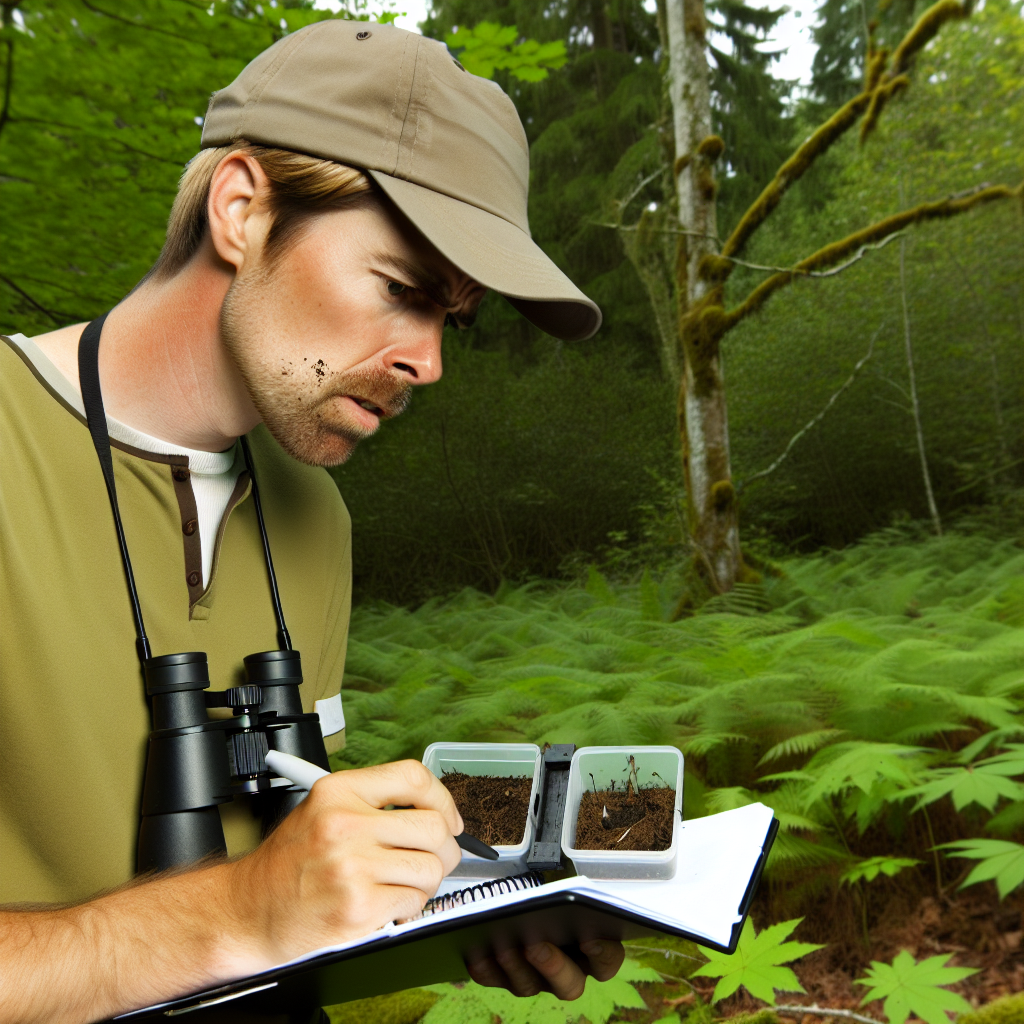Overview of Ecology and the Role of Ecologists
Ecology is the study of interactions between organisms and their environment.
This field explores how living beings influence and are influenced by their surroundings.
Ecologists play a vital role in understanding these complex relationships.
They investigate ecosystems, populations, and the factors affecting biodiversity.
Moreover, their work informs conservation efforts and environmental management.
Defining Ecology
Ecology encompasses various aspects of life on Earth.
It examines the distribution and abundance of organisms.
Additionally, it looks at ecosystem dynamics and the flow of energy through systems.
Ecologists study interactions across different scales.
This includes individual organisms, communities, and entire ecosystems.
Responsibilities of Ecologists
Ecologists conduct research to gather data on environmental conditions.
They develop hypotheses to explain ecological phenomena.
Additionally, ecologists often engage in fieldwork to collect samples.
Data analysis is essential for interpreting results and understanding patterns.
They also communicate their findings to policymakers and the public.
Research and Data Collection
Field studies are a key component of ecological research.
Ecologists measure environmental variables such as temperature and precipitation.
They monitor wildlife populations to assess health and diversity.
Data Analysis and Interpretation
Statistical methods allow ecologists to analyze complex data sets.
They identify trends and correlations in ecologically relevant data.
These analyses form the basis for conservation strategies.
Application of Ecological Research
Ecologists influence environmental policies and conservation initiatives.
Their research supports habitat restoration projects.
Further, they provide insights into climate change impacts on ecosystems.
By collaborating with various stakeholders, they help implement sustainable practices.
Unlock Your Career Potential
Visualize a clear path to success with our tailored Career Consulting service. Personalized insights in just 1-3 days.
Get StartedConservation Efforts
Ecologists develop strategies to protect endangered species.
They also promote habitat conservation to maintain biodiversity.
Climate Change Mitigation
Research on ecological responses to climate change is crucial.
Ecologists study adaptive strategies of organisms under changing conditions.
Their findings guide effective climate action plans.
Key Responsibilities of Ecologists in Field Research
Conducting Field Studies
Ecologists design and implement field studies to gather essential data.
They choose appropriate study sites based on research objectives.
Additionally, they select suitable sampling methods for data collection.
Field studies often include observing wildlife and collecting soil samples.
Moreover, they also monitor environmental conditions impacting ecosystems.
Data Collection and Analysis
Ecologists meticulously collect quantitative and qualitative data in the field.
They use various tools and instruments to enhance accuracy.
Following data collection, they analyze data to identify patterns.
Statistical methods help them assess the significance of their findings.
Furthermore, software programs aid in data organization and visualization.
Collaborating with Other Researchers
Collaboration is key in ecological research initiatives.
Ecologists often work with biologists, geologists, and climatologists.
They share insights and methodologies to enrich research outcomes.
Regular meetings foster open communication and project updates.
Joint surveys can expand the scope and scale of research efforts.
Reporting Findings
Once analyses are complete, ecologists prepare detailed reports.
They highlight key findings and their implications for conservation.
Additionally, they may present results at academic conferences.
Publishing research in scientific journals reaches a broader audience.
Clear communication ensures their work influences policy and practice.
Data Collection and Analysis Methods Used by Ecologists
Field Surveys
Ecologists often conduct field surveys to gather data on ecosystems.
They use systematic sampling techniques to ensure accuracy.
Such surveys can include flora and fauna assessments.
Additionally, researchers may measure environmental variables such as temperature and humidity.
Remote Sensing
Remote sensing plays a crucial role in ecological studies.
This method allows ecologists to collect data over large areas efficiently.
Satellite imagery helps track land use changes and vegetation cover.
Aerial photography further aids in monitoring habitats.
Laboratory Experiments
Laboratory experiments complement field studies for ecologists.
They allow researchers to control variables effectively.
Often, ecologists study species interactions and biochemical processes in controlled settings.
This approach enhances the understanding of complex ecological dynamics.
Statistical Analysis
Statistical analysis is vital for interpreting ecological data.
Ecologists apply various statistical methods to identify patterns and relationships.
Common techniques include regression analysis and ANOVA.
These tools help in testing hypotheses and drawing conclusions.
Modeling Techniques
Ecologists utilize modeling techniques to predict ecological outcomes.
These models simulate ecosystem processes under various scenarios.
By incorporating historical data, they can forecast future trends.
Such predictions support conservation and management efforts.
Citizen Science
Citizen science engages the public in ecological research.
Participants help collect data on wildlife and environmental changes.
This collaborative approach increases the volume of data available.
Moreover, it raises awareness of ecological issues among communities.
Uncover the Details: How to Network and Build a Career in Geology
Ecologists’ Role in Environmental Conservation and Management
Understanding Ecological Research
Ecologists study the interactions between organisms and their environment.
They collect and analyze data to understand ecosystems better.
Research helps identify species and their roles within ecosystems.
Additionally, it informs conservation efforts and management practices.
Contributing to Conservation Strategies
Ecologists develop strategies to protect endangered species.
They conduct assessments to evaluate threats to habitats.
Effective conservation often involves community engagement.
Collaboration with local stakeholders ensures successful implementation.
Moreover, ecologists monitor the progress of conservation initiatives.
Promoting Sustainable Practices
Ecologists advocate for sustainable land use practices.
They analyze the impact of human activities on the environment.
Additionally, they provide recommendations for minimizing harm.
This may involve creating guidelines for agriculture and forestry.
Furthermore, ecologists educate the public about sustainability.
Restoration Ecology
Restoration ecology focuses on rebuilding degraded ecosystems.
Ecologists assess the needs of ecosystems requiring restoration.
They design and implement projects to restore biodiversity.
These projects often involve reintroducing native species.
Furthermore, monitoring is essential to ensure restoration success.
Collaborating with Other Disciplines
Ecologists often work alongside conservation biologists and land managers.
Interdisciplinary collaboration enhances conservation effectiveness.
They integrate knowledge from various fields to address environmental issues.
Moreover, ecologists contribute to environmental policy development.
They provide scientific evidence to guide legislative actions.
See Related Content: Tools and Technology Every Ecologist Should Know
Collaboration with Other Disciplines
The Importance of Interdisciplinary Collaboration
Ecologists often collaborate with various disciplines to enhance research effectiveness.
This approach facilitates a comprehensive understanding of complex ecological issues.
Involving experts from different fields brings diverse perspectives and skills.
Consequently, interdisciplinary teams can tackle challenges more efficiently.
Common Collaborations in Ecology
Ecologists frequently work with environmental scientists for data analysis.
This collaboration aids in understanding ecological impacts on the environment.
Additionally, partnerships with geologists help in studying landforms and ecosystems.
Furthermore, they often engage with urban planners to develop sustainable communities.
Case Studies of Successful Collaborations
A notable example is the collaboration between ecologists and hydrologists.
This team successfully restored a river ecosystem in the Pacific Northwest.
Another example involves ecologists working with agricultural scientists.
They developed practices that improved crop yields while preserving biodiversity.
Tools and Techniques for Effective Collaboration
Effective communication is essential in interdisciplinary teams.
Using collaborative software can streamline project management and data sharing.
Regular meetings ensure all team members contribute their expertise.
Moreover, training sessions can help bridge knowledge gaps between disciplines.
Find Out More: Career Pathways for Aspiring Epidemiologists

Job Opportunities and Career Growth for Ecologists
Overview of Ecology Careers
Ecologists play a vital role in understanding ecosystems.
They study interactions among organisms and their environments.
This field offers diverse job opportunities across various sectors.
Many ecologists work in academia, research, and consulting firms.
Others find roles in government agencies and non-profit organizations.
Types of Job Roles
Ecologists can specialize in different areas of study.
Field ecologists conduct research in natural settings.
They collect data and sample environments for analysis.
Laboratory ecologists analyze samples and data back at the lab.
Corporate ecologists focus on environmental impacts of companies.
Ecological consultants provide expert advice on projects and policies.
Required Skills and Qualifications
A strong educational background is essential for ecologists.
Most positions require at least a bachelor’s degree in ecology.
Many roles prefer candidates with a master’s or Ph.D.
In addition, field experience enhances employability.
Skills in data analysis and research methods are also crucial.
Professional Development Opportunities
Continuing education plays an important role in an ecologist’s career.
Attending workshops and conferences can facilitate skill development.
Networking with fellow professionals opens new job opportunities.
Joining professional organizations enhances credibility and resources.
Certification programs can further validate expertise.
Employment Trends and Outlook
The demand for ecologists is expected to grow in the coming years.
Increased focus on environmental conservation drives this demand.
Climate change awareness leads to more opportunities in research.
Sustainability efforts in industries also contribute to job growth.
Ultimately, ecologists can expect a dynamic and evolving job market.
Salary Expectations
Ecologist salaries vary based on experience and location.
Entry-level positions generally offer lower starting salaries.
With experience, salaries can rise significantly.
Industry roles often pay more than academic positions.
Overall, ecologists can earn competitive salaries in various fields.
You Might Also Like: Tools and Technologies Epidemiologists Use
Educational Requirements and Skill Development for Aspiring Ecologists
Educational Background
A strong educational foundation is essential for ecologists.
Most positions require at least a bachelor’s degree in ecology or a related field.
Many ecologists pursue further studies, obtaining master’s or doctoral degrees.
Relevant majors include biology, environmental science, and natural resource management.
Importance of Field Experience
Field experience is invaluable for aspiring ecologists.
Internships with environmental organizations provide practical knowledge.
Fieldwork helps develop observational and analytical skills.
Participation in research projects can bolster one’s resume significantly.
Essential Skills for Ecologists
Ecologists must possess a variety of skills to succeed.
Analytical skills allow them to interpret complex data effectively.
Strong communication skills are vital for presenting findings clearly.
Additionally, they must demonstrate critical thinking abilities in problem-solving.
Technical proficiency with ecological software and tools is also increasingly necessary.
Certifications and Professional Development
Certifications can enhance an ecologist’s credentials.
The Ecological Society of America offers professional certifications for ecologists.
Attending workshops and seminars helps professionals stay updated on trends.
Moreover, networking within the ecological community is beneficial for career growth.
Career Pathways and Specializations
Ecologists can explore various career pathways based on their interests.
Some may focus on wildlife conservation, while others study ecosystems.
Specializations such as restoration ecology or marine biology are also common.
Each pathway offers unique challenges and rewarding experiences.
Challenges Faced by Ecologists in the Modern Job Market
Adapting to Rapid Technological Changes
Ecologists often struggle to keep up with rapid technological advancements.
New tools and software frequently emerge in the field.
These changes require continuous learning and skill adaptation.
Moreover, staying updated is essential for effective data analysis.
Navigating Job Competition
Increased interest in environmental careers leads to fierce competition.
More graduates enter the job market each year.
As a result, experienced positions become harder to secure.
Networking becomes crucial for standing out among applicants.
Securing Funding for Research
Many ecologists rely on grants for their research projects.
Securing these grants can be a lengthy and challenging process.
Competition for funding often makes it difficult to proceed with studies.
Additionally, fluctuating budgets impact long-term research plans.
Public Communication and Education
Ecologists face challenges in translating scientific findings for the public.
It is vital to communicate complex ideas clearly and effectively.
Public engagement is necessary to gain support for ecological initiatives.
Moreover, misconceptions about environmental issues can hinder progress.
Working in Diverse Environments
Ecologists often work in varied and sometimes harsh conditions.
Fieldwork can involve remote locations and unpredictable weather.
These conditions can lead to physical and mental exhaustion.
Adaptability is essential for working effectively in the field.
Additional Resources
Ecology and Evolution of Infectious Diseases (EEID) | NSF …
Power research in adaptive water governance and beyond: a review …




